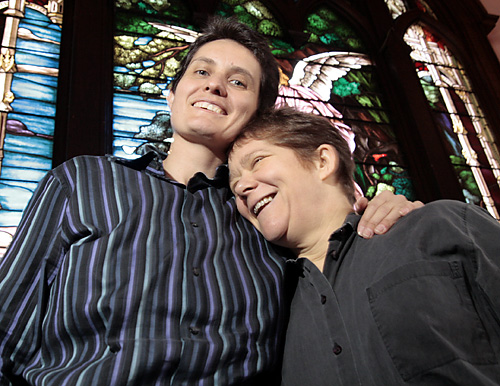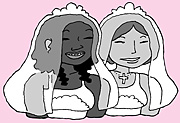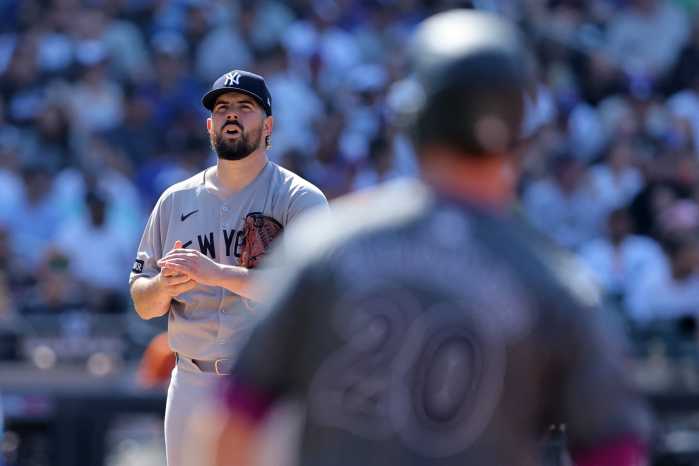Carol Scott stood before her congregation one recent Sunday and announced she had rescinded her membership in the National Methodist Church due to its discriminatory stance on homosexuality. It was a life-altering moment for the 41-year-old Prospect Heights resident.
“It was an incredibly hard decision that took many months of prayer, mediation and grieving,” she said that afternoon in the basement of Park Slope United Methodist Church.
“But it was a deepening, clarifying step in my faith journey. I’m not stepping away from my faith; I’m stepping more into it.”
Dorothee Benz, 44, Scott’s partner of three years added: “Many of us wrestle with this every day and it’s an almost constant questioning. But if you’re interested in a spiritual journey, there are places within the church that get it right.”
Scott and Benz are among the many religious members of Brooklyn’s gay and lesbian community. Bound either by tradition or the need for spiritual ties to religious institutions that deem their sexuality immoral, many struggle to divorce faith from church policy. But whether they remain active in their denominations or choose to worship only as part of a local congregation, gay people here seem increasingly comfortable practicing their faith in an organized way.
Take Laura Perry, a former Catholic who joined Park Slope Methodist in 2003.
Perry left the Catholic Church more than two decades ago due to what she called “conflicts of prejudice and exclusion.”
She remained a woman without a church for the next 18 years, but when she moved to Park Slope, she decided that joining a church would be a good way to become active in the community.
At Park Slope Methodist, she felt like she “had come home,” she said.
The church not only welcomes gays and lesbians, but also has a “reconciling committee” that works toward changing national church policy, and as a sign of solidarity will not perform any wedding ceremonies until all people can get married.
Now 58, Perry is troubled by the policies of her national church, which bars homosexuals from ministry and marriage. But she takes pride in her local congregation — 30 percent of which, according to its pastor, is gay and lesbian.
Ira Sherman, 55, of Carroll Gardens, feels the same way about Kane Street Synagogue in Cobble Hill. For 16 years, he’s attended services at this Conservative synagogue.
“My first recollection [of Kane Street Synagogue] was an impassioned speech by its then-president in response to anti-gay remarks Pat Robertson made,” Sherman recalled. “I was surprised to find such an accepting congregation.”
Conservative Judaism as a whole, Sherman noted, is re-thinking its positions on homosexuality. Recent policy revisions allow for the acceptance of openly gay and lesbian students into professional rabbinic schools, and for the recognition of same-sex partners.
But different faiths vary. The Muslim world still considers homosexuality highly taboo. An international gay Muslim organization called Al-Fatiha has gained prominence, but New York lacks an organized gay Islamic presence.
And while some Christian denominations, like the Episcopalians, have made significant strides towards eliminating discrimination within their churches, only two — the Unitarian Universalist Association and the United Church of Christ — have eliminated all barriers, including marriage, between gay and straight members.
Many Christians, both gay and straight, believe the Bible’s message of unconditional acceptance supports the notion of equality for homosexuals.
“You can’t get through a page of the New Testament without being confronted with the mandate of being truly welcoming and open to all people,” said Benz.
But the governing bodies of most Chistian faiths interpret other portions of the Bible as a condemnation of homosexuality.
That staunch opposition to homosexuality drove Bill Foote away from his local parish and towards a monthly mass organized by Dignity/Brooklyn, the local chapter of a national support network for gay Catholics.
The group hosts mass every third Saturday of the month in a Prospect Heights brownstone owned by St. Ann & the Holy Trinity Episcopal Church. For a lifelong Catholic like Foote, it’s a way to remain connected to a religion that does not fully accept his sexuality.
“It’s helped me to better understand my faith,” said the 55-year-old. “I like the idea that I feel very much a part of the church even though I’m not active in a parish. It’s about following a belief that’s ingrained in you.”
Scott, the recently resigned Methodist, plans to remain an integral part of Park Slope Methodist. She said at this point in her life, she is focused on “living according to the Gospel” as opposed to being a Methodist.
“Faith is not the church, or what any one rulebook tells you,” she said. “It’s a living, breathing relationship just like any other.”






















